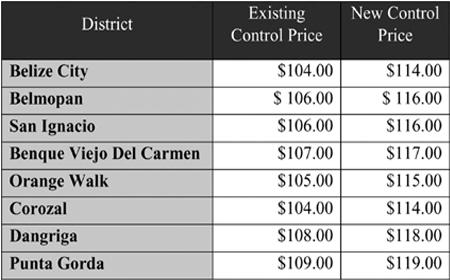The only ting di go down “da u chance ah living!”
Electricity rates to increase by 7.1 percent in July; cost of cooking food going up again, by $10 per 100-lb cylinder
BELIZE CITY, Thurs. Apr. 5, 2018– A release today from Government’s Press Office said that there will be another significant increase in the cost of butane tomorrow, Friday, April 6.
A rise in the price of LPG (butane, propane) is never good news, especially a steep rise. The price hike is a direct blow to the stomach, a higher cost for the preparation of food, so it is never implemented without a considerable amount of grumbling.
The price hike is almost always initiated by the importers of LPG, and everyone knows the effect it will have on the economy.

The importers usually have their way. They are so insistent they even went on strike, in 2007, to force government to give in to their demands.
In January, 2017, the Belize Bureau of Standards announced an 18% increase in the cost of Liquefied Petroleum Gas (LPG), putting the cost of butane at $97 per hundred-pound cylinder in Belize City, and $102 in Punta Gorda.
In January, 2018, the Belize Bureau of Standards announced the extent of another blow, which was that the cost of a 100-pound cylinder of butane gas had increased across the country by $7. This took the price of a 100-lb. cylinder of gas in Belize City to $104, and a 100-lb. cylinder of gas in Punta Gorda to $109.
This month the LPG importers have again demanded, and government again has yielded. The Supplies Control Unit (SCU) announced on Thursday, April 5, that effective Friday, April 6, there will be a new price hike for Liquefied Petroleum Gas (LPG).
The blow that will land on Friday is considerably heavier than the one in January. When Belizeans wake up tomorrow there will be a $10 rise across the board in the cost of a 100-pound cylinder of LPG.
The Controller of Supplies, José E. Trejo, issued the new controlled prices per 100-lb cylinder of LPG. In Belize City, the price increased from $104 to $114. In Belmopan and San Ignacio, the 100-lb cylinder of LPG is now $116; in Benque Viejo, $117; in Orange Walk, $115; in Corozal, $114; in Dangriga, $118; and in Punta Gorda, $119.
The Controller of Supplies explained that the “prices established for imported LPG are based on the mixtures of 70:30 (Propane: Butane) only as per requirement of the Belize National Standard Specification for Liquefied Petroleum Gas (LPG).”
Yesterday Wednesday, April 4, Belize Electricity Limited (BEL), issued a press release in which it announced that it is calling on the Public Utilities Commission (PUC) to allow the company a rate increase of 7.1% for the period July 1, 2018 to June 30, 2019. BEL explained that the call for an increase in electricity rates is necessary to offset an “increase in the cost of power purchased from power producers.”
In its 2016 annual report, BEL said that the purchase of power constitutes 70% of its operating costs before taxes. The bulk of the electricity Belize uses comes from BECOL — hydroelectricity produced via the Mollejon, Chalillo, and Vaca dams; and from the Mexican national grid, Comisión Federal de Electricidad (CFE Mexico).
The rest of our electricity comes from Hydro Maya (Southern Belize), Belcogen and Santander (biomass), and BEL’s power plants (diesel generators). The press release did not explain the increased cost of the power the company purchases.
The latest report on the energy sector by the Statistics Institute of Belize (SIB) says, “High water levels in the country’s dams coupled with an increase in demand resulted in a 20.6 percent jump in electricity generation from 86 thousand megawatt hours in the fourth quarter of 2016 to 103.7 megawatt hours in the fourth quarter of 2017.”
And the good fortune in the hydroelectricity sector continues. The rains that drenched the crops of Belizean farmers earlier this year, negatively affecting the matahambre corn, and the bean, potato, and watermelon crops*, were good news at Chalillo and Vaca.
Belize tries to use energy from CFE Mexico during non-peak hours, when the rates per kWh are around 8 or 10 cents. When Belize has to buy power from CFE during peak hours, the cost can be exorbitant. Ernesto Gomez, Senior Manager, Energy, Stores and Regulatory Affairs, at B.E.L., told News Five’s Aaron Humes (Feb. 27, 2018) that the price of electricity from CFE can go “as high as twenty-five cents U.S. per kilowatt-hour.”
BEL announced recently that through a new Power Purchase Agreement (PPA) it had signed with CFE Mexico, it would be able “to purchase more power from Mexico when prices are low.”
7News reported on February 19, 2018, that BEL had announced that it had signed an agreement with an affiliate of CFE called CFE Calificados, which would allow the company to sell energy to Mexico. Belize has no shortage of power when the dams are full, and the mills at ASR/BSI and Santander are in full operation.
These developments notwithstanding, BEL says that it lost money during the last rate review period, 2016-2017, because the “actual cost of power was $3.8 million higher than the Reference Cost of Power approved by the PUC.” BEL says that it had to finance the difference over the period.
BEL forecasts that the “cost of power will be $4.8 million higher than what was approved by the PUC for the 2017-2018 review period,” and that to remain viable it needs “a 7.1% average increase in the Mean Electricity Rate (MER) to $0.3954/kWh, from the current MER of $0.3692/kWh.”
BEL says that our electricity rates, which have been “below $0.37/kWh over the last two years” are “one of the lowest in the Central American and Caribbean region.”
(*The Ministry of Agriculture is yet to report on the extent of losses Belizean farmers suffered due to the extended heavy rains in Belize earlier this year.)

